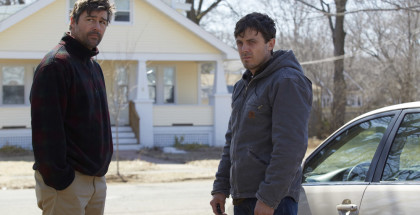Netflix’s Terrace House: The perfect replacement for Love Island
David Farnor | On 30, Jul 2017
With a new season of Terrace House on Netflix UK, why you should be watching this unique reality series.
Three men. Three women. One gigantic house. A whole lot of cameras. And a swimming pool. It might sound like the latest season of Love Island, but with ITV’s reality TV behemoth over for another year, this is the ideal replacement: Terrace House.
ITV’s show had its biggest ever year this summer, erupting into a national phenomenon. Everyone was watching, including Stormzy, drawn in by its candid, warts-and-all snapshot of people trying to hook up with each other – or are they just trying to get to the finale and take home the cash prize? For all the gossipy fun of people back-stabbing their rivals and getting revenge, it’s the sweet moments where romance actually blossoms that really win over viewers, and 2017’s edition of Love Island had more than its fair share. When it comes to sincere displays of emotion, though, Terrace House trumps Love Island: it’s not just the perfect show to fill the Love Island-shaped whole in your life; it’s actually better.
If you’re wondering why you’ve never heard of it, the answer is simple: Terrace House is a reality TV show from Japan. But after it proved so popular in its home country, Netflix stepped in to commission more episodes to release worldwide. And so we have Terrace House: Aloha State, the latest entry in the long-running series, which sees the programme step outside of Japan for the first time. Their destination? Hawaii, of course, where a house has been acquired complete with pool, lush gardens and a stunning beach backdrop.
Netflix’s decision is a smart one, as it attempts to build its global membership base by investing in diverse content from different target markets. It’s smart because the streaming service knows that reality TV has a universal appeal, as we recognise typically human urges for companionship, success, friends and a chance for a free dip in a fancy pool. But where ITV’s Love Island succeeds by letting viewers see themselves on screen, right down to the swearing and emotional strops, Terrace House is fascinating because it offers a window onto a completely different culture. Yes, the setup is broadly the same, but the result is refreshingly new: everything is quieter, politer, and more mature.
Where people are normally described and evaluated on their appearance or their love life, here, our contestants are assessed, in a large part, on their careers: we’re introduced to each teen or 20-something with their job title or planned employment, presenting us with a diverse group that ranges from Avian, who works in her mother’s shoe shop, to Eric, a carpenter. Lauren, an illustrator and model, bonds with Yuya, an aspiring actor, as they go jogging together – but she also has a connection with Eric, as they both like drawing. Lauren, though, doesn’t drink, which is where Naomi finds her common ground with Eric; the two bond over booze, despite the fact that, four years his junior, she has no plan for her life yet. (“Undecided” is the word that accompanies her in the opening credits.)
Inevitably, there’s someone in the house who plays a musical instrument, but where you might expect a show-off bloke wielding a guitar, instead we get Yusuke, a ukelele player who has never had a girlfriend before. He’s an utterly endearing presence, slowly falling for Lauren while impressing all the girls with his musical prowess and humble attitude. One of the biggest bits of drama in the show’s first part (it’s divided into three) revolves around Yuya mocking Yusuke’s virginity – a playful jibe that wouldn’t even raise an eyebrow on Love Island. But even that is moved on from with restraint and respect.
That might sound like a dull watch, but it makes the whole thing far more compelling – every time something potentially scandalous comes up, it’s resolved through calm communication founded on mutual consideration. The lack of histrionics might disappoint avid Love Islanders, but after an episode, it becomes addictively earnest; with fewer dramatics, there’s less sense of artificiality, so what might usually come across as a string of contrived situations with people acting up for the cameras instead seems sincere. Even the participants don’t leave based on public votes: they essentially come and go as they please, heading out to jobs during the day, if they have them, and moving on from the house altogether when they feel ready.
The result manages to take out all the bad parts of reality TV, a format that has become toxic over the many years since Big Brother first aired on Channel 4. There’s no threat of a loud, unlikeable person to make you want to throw the remote at your screen or turn it off; there’s no manufactured narrative to encourage you to call premium numbers to vote for your least favourite; and there are none of those irritating confessional diary room sessions.
Even more impressive is the way that the live aspect of what would otherwise be considered “event TV” has also disappeared: in a format suited to Netflix, you can watch this at any time you like, without having to worry about putting aside an hour every weeknight. But the three-part structure, spread over the most part of a year, means that it’s easy to coordinate with fellow reality TV fans when to tune in, so you can all gossip about the episodes, as they land each week after their Japanese broadcast. With a rotating group of subjects to boot, you won’t even get bored talking about the same people: Netflix extended Aloha State from 24 episodes to 36, which means by the end, it’s a completely different set of people to its beginning. (Poor Yusuke drops out about a third of the way through.)
And, to cap it all off, the series keeps the pace fast, mixing up the action in short 30-minute episodes with a bunch of comedians and TV personalities – You, Reina Triendl, Yoshimi Tokui, Azusa Babazono, Ryota Yamasato – continuously discussing, commenting on and recapping what’s happening. The result is quick to watch, but also means you don’t need to tune in to a separate after-show to get your informal breakdown of events or lazy highlights show.
They may not be so much fornication – Love Island deserves some credit for encouraging the discussion of sex away from the cliches of fictional drama – but there’s a heartwarming sense of real friendships being forged (people from differing backgrounds offer to teach each other their respective languages), and of a genuine portrayal of young Japanese people coming of age. So if you’re missing Love Island, grab some mates and say Aloha to your new Netflix obsession: this is reality TV that feels, well, real.
Terrace House is available on Netflix UK, as part of an £9.99 monthly subscription.





















